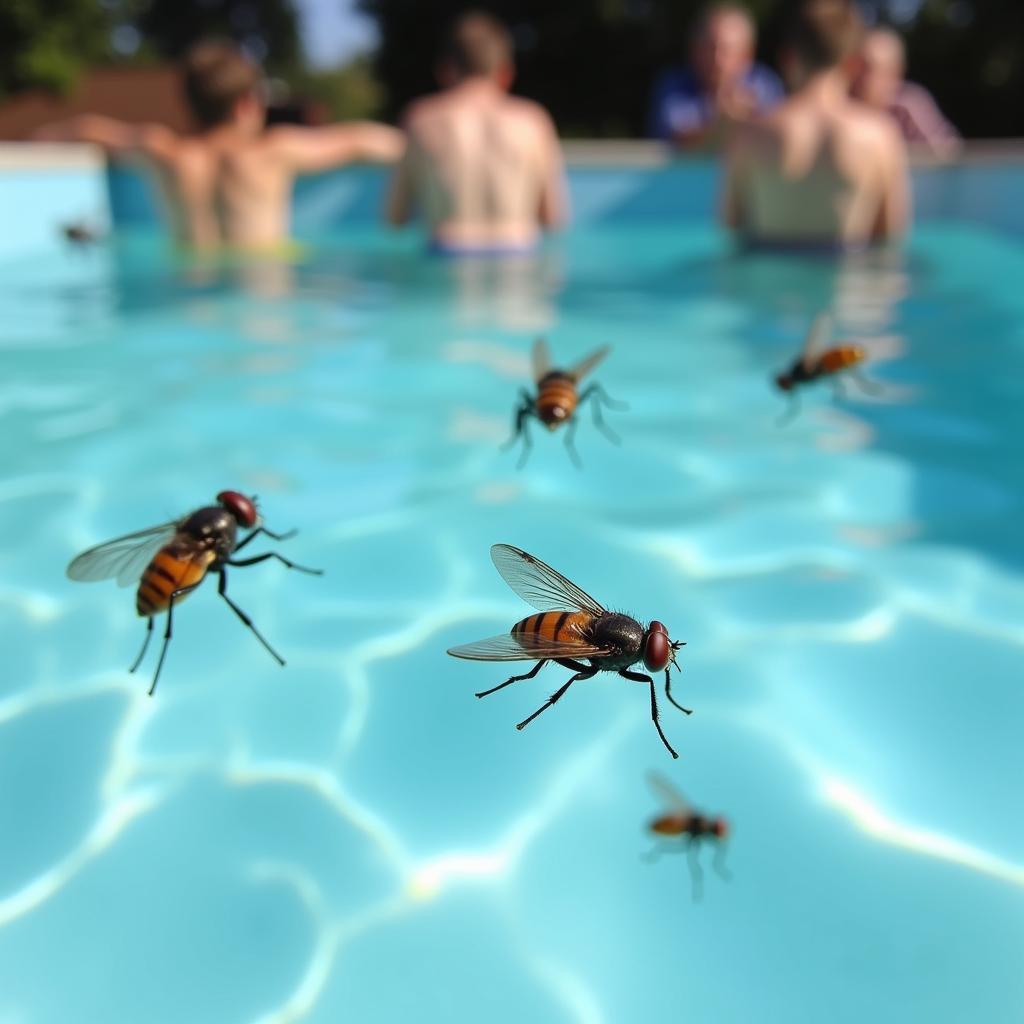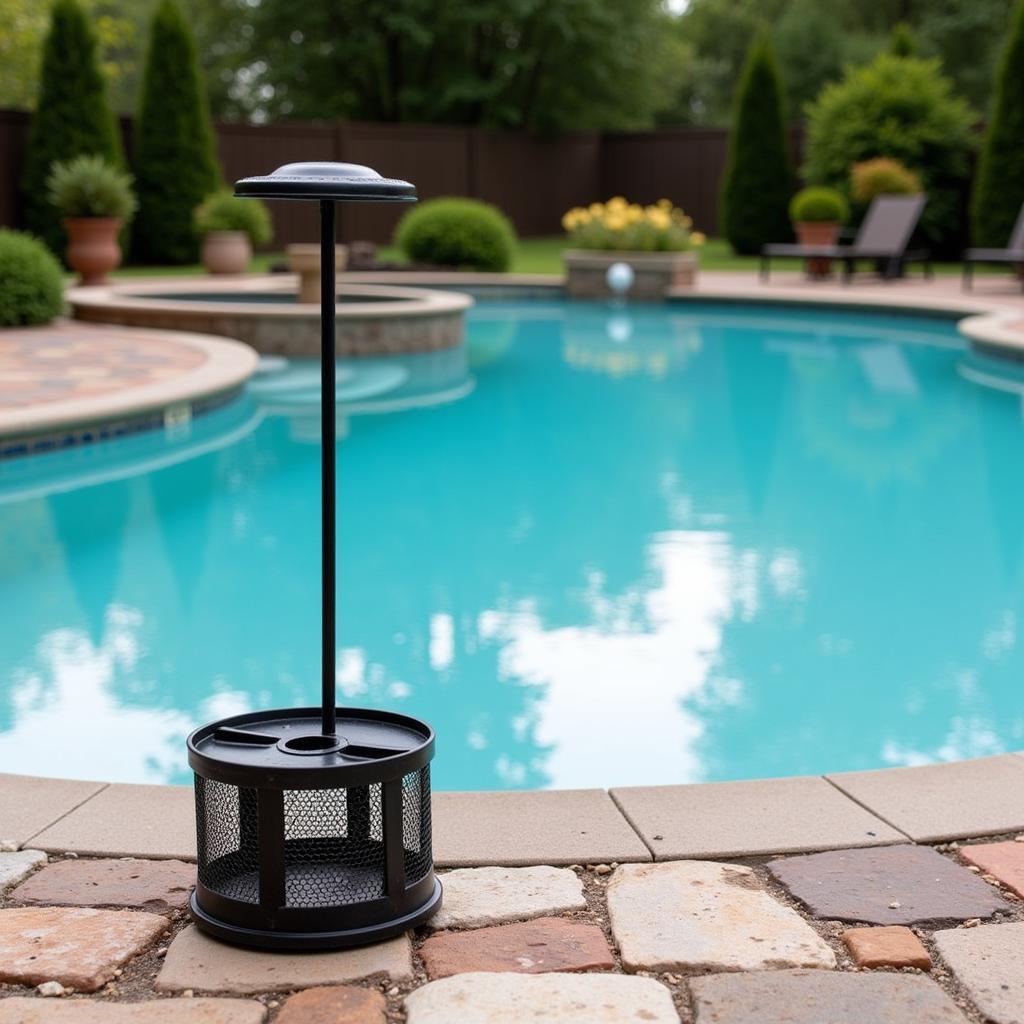Horse flies buzzing around your pool can quickly turn a relaxing swim into a swatting frenzy. Finding an effective solution to deter these pests is essential for enjoying your pool area. This article will explore various methods for how to deter horse flies from your pool, from natural repellents to strategically placed traps.
Understanding Horse Fly Behavior
Before diving into solutions, it’s important to understand why horse flies are attracted to your pool. These insects are drawn to large, dark, moving objects, which they often mistake for potential hosts. The glistening water of your pool, coupled with the movement of swimmers, can create an irresistible beacon for these biting pests. They’re also attracted to carbon dioxide and warmth, both of which are present around pool areas. Knowing these attractants helps us understand how to deter them effectively.
 Horse flies buzzing around a swimming pool
Horse flies buzzing around a swimming pool
Natural Repellents for Horse Flies
Several natural methods can help deter horse flies without resorting to harsh chemicals. Essential oils like citronella, lavender, and eucalyptus are known to repel various insects, including horse flies. You can create a spray by mixing a few drops of these oils with water and spraying it around the pool area. Planting herbs like mint, basil, and rosemary around your pool can also help create a natural barrier against these pests. Another natural deterrent is diatomaceous earth horses, which can be sprinkled around the pool perimeter to deter horse flies.
Harnessing the Power of Plants
Specific plants, like Venus flytraps and pitcher plants, are carnivorous and can help control the horse fly population around your pool. While they won’t eliminate all the flies, they can contribute to a more manageable environment.
Traps and Other Physical Deterrents
Various traps can be effective in capturing and eliminating horse flies. Sticky traps, often black or blue in color, attract the flies and then trap them on their sticky surface. Another option is a horse fly trap that uses a large, dark ball that mimics a potential host. The flies are attracted to the ball and then trapped inside a container.
Creating a Physical Barrier
Installing screens or netting around your pool area can create a physical barrier to prevent horse flies from entering. This is particularly helpful for smaller pools or designated swimming areas. Choose fine mesh netting to ensure that even smaller insects are kept at bay.
 A horse fly trap placed near a swimming pool
A horse fly trap placed near a swimming pool
Maintaining a Clean Pool Environment
A clean pool environment is less appealing to horse flies. Regularly skimming the water surface removes debris and organic matter that might attract them. Ensure proper pool maintenance, including regular cleaning and chlorination, to minimize the presence of attractants. Keeping the surrounding area clean and free of standing water also helps reduce breeding grounds for these pests.
Why is My Pool Attracting Horse Flies?
Your pool might be particularly attractive to horse flies if it’s located near areas where horses or livestock are present. These flies are naturally drawn to these animals, and your pool can become an unintended target.
Conclusion
Dealing with horse flies around your pool can be frustrating, but with the right approach, you can effectively deter these pests and enjoy a more pleasant swimming experience. From natural repellents and traps to maintaining a clean pool environment, implementing these strategies can significantly reduce the presence of horse flies and make your pool a more inviting space. Remember to consider the specific environment around your pool and choose the methods that best suit your needs.
FAQ
- What attracts horse flies to a pool? Horse flies are attracted to the dark, moving water, as well as the carbon dioxide and warmth emitted by people.
- Are horse fly bites dangerous? While painful, horse fly bites are usually not dangerous unless an allergic reaction occurs.
- What is the most effective horse fly trap? Traps that use a dark, moving object to mimic a host animal are often very effective.
- How can I prevent horse flies from breeding near my pool? Eliminate standing water and keep the pool area clean to discourage breeding.
- Do horse flies bite at night? Horse flies are primarily daytime pests.
- Can I use insect repellent on myself while swimming? Check the label of the insect repellent to ensure it’s safe for use in water.
- What are some other natural ways to deter horse flies? Planting certain herbs and using essential oils like citronella can help repel them.
If you need further assistance, please contact us. Phone: 0772127271, Email: [email protected]. Or visit us at: QGM2+WX2, Vị Trung, Vị Thuỷ, Hậu Giang, Việt Nam. We have a 24/7 customer service team.